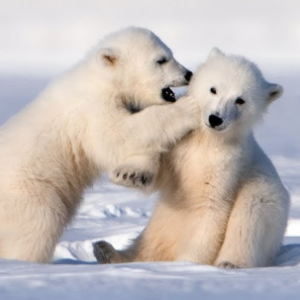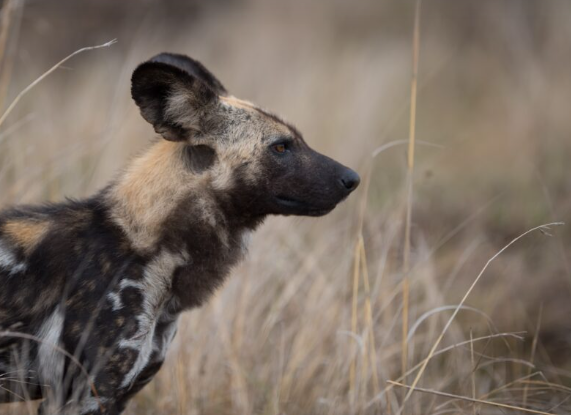
African wild dogs are fascinating creatures that display a high level of social cooperation within their packs. Despite living in groups that can reach up to 40 members, these canines have a unique social structure based on strong bonds and teamwork.
Unlike other predators, there is little aggression exhibited between members of the pack, and they instead work together to care for wounded or sick individuals.
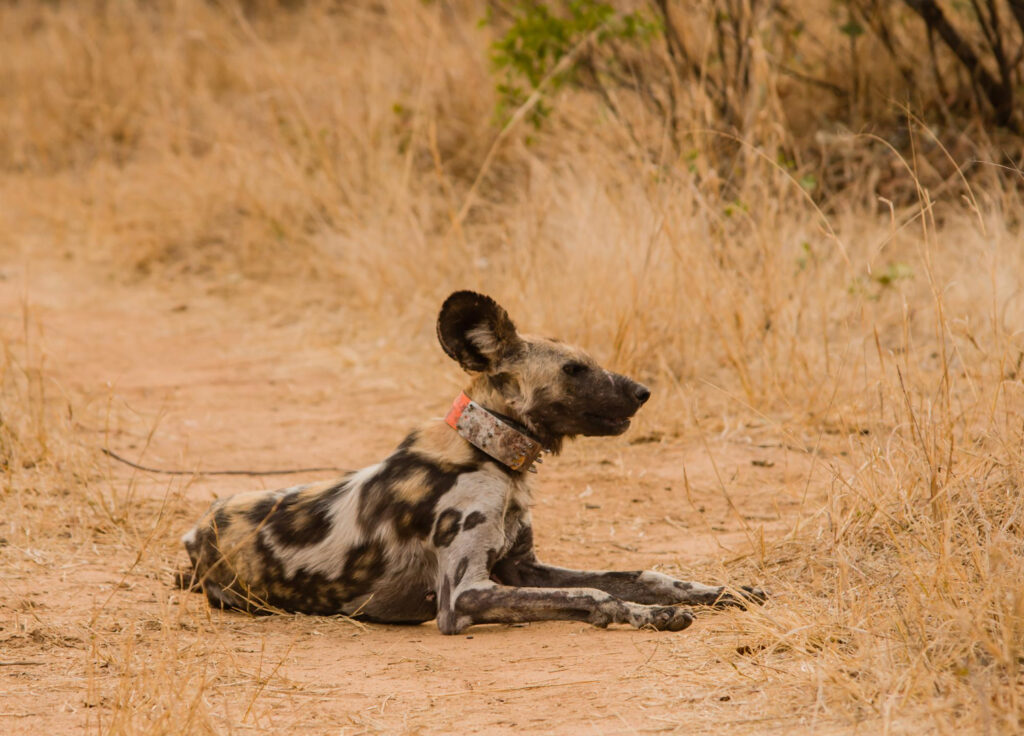
This cooperative behavior is essential for the survival of the pack and allows them to successfully hunt large prey such as antelope.
One interesting aspect of African wild dog packs is the presence of a dominant pair who are usually the only monogamous couple in the group. This dominant pair takes on leadership roles within the pack, coordinating hunts and making decisions for the group.
Their monogamous relationship helps to maintain stability within the pack, as it prevents conflict over mating opportunities and ensures that resources are distributed fairly among all members.
Overall, African wild dogs’ unique social structure highlights their remarkable ability to work together as a team to thrive in their challenging environment.
The African wild dog is a fascinating and unique species known for its colorful and patchy coat, large bat-like ears, and bushy tail with a white tip. Each individual wild dog has a distinct pattern on their coat, making it easy to identify them.
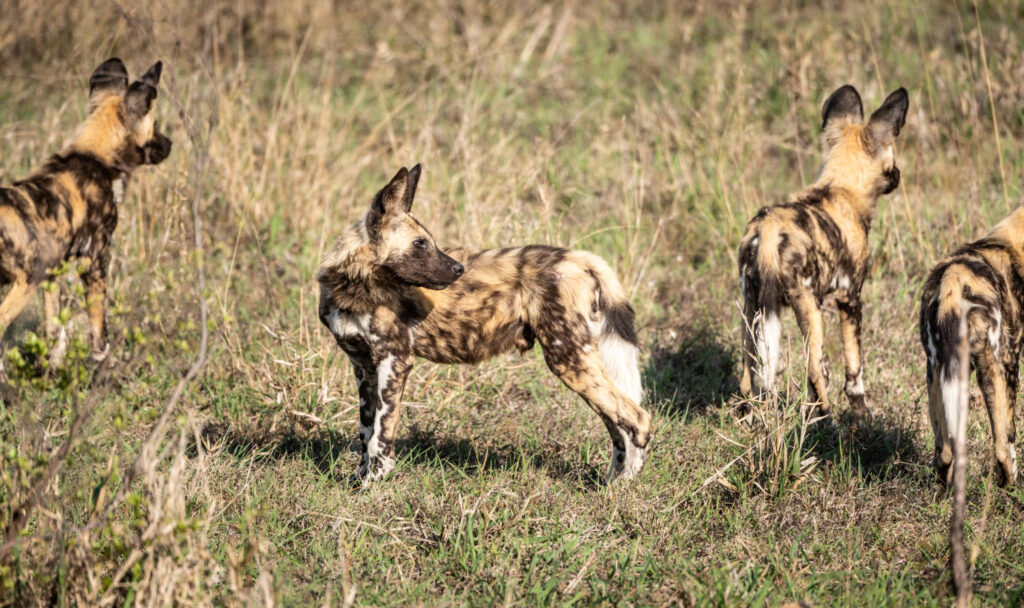
These social animals live in packs and work together while hunting, using their white-tipped tails as a form of communication to keep the pack connected during hunts.
Unfortunately, African wild dogs are currently listed as endangered due to habitat loss, human-wildlife conflict, and infectious diseases.
The scientific name for the African wild dog is Lycaon pictus, reflecting its wolf-like appearance and painted coat. They typically weigh between 18-36 kilograms and measure about 1 meter in length.
Conservation efforts are crucial to protect these beautiful creatures and ensure their survival for future generations to appreciate and admire.
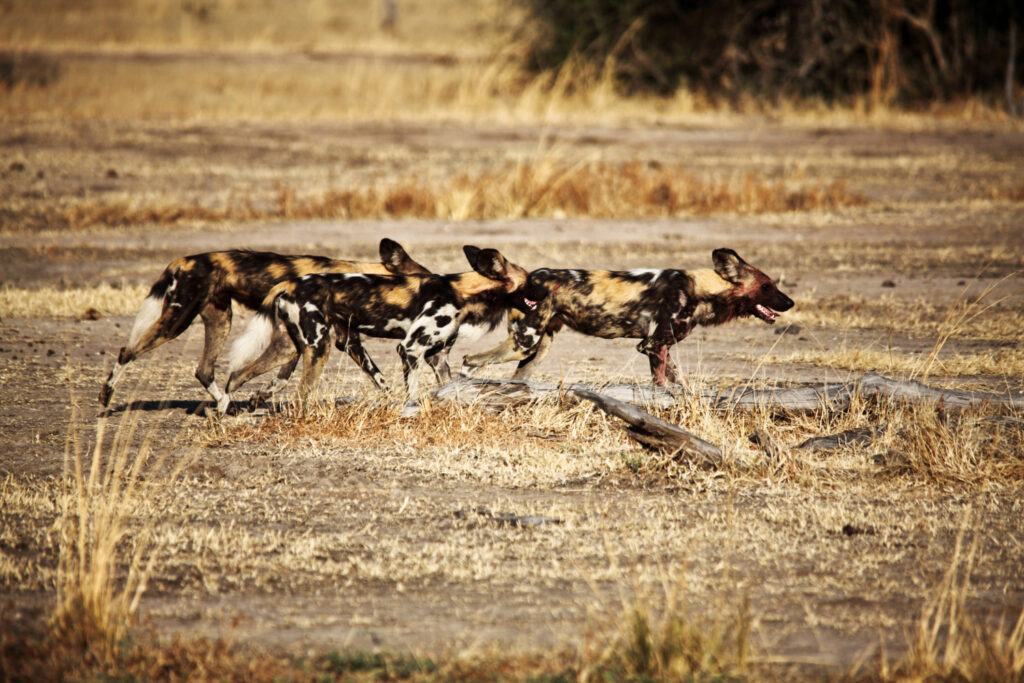
African wild dogs are known for their unique physical characteristics that set them apart from other canids. Their slender, long-legged bodies are built for running and hunting, making them one of the most efficient predators in the African savannah.
Their individually distinct coat patterns help to camouflage them in their natural habitat, with a mix of black, brown, white, and tan fur creating a visually stunning appearance.
The large, rounded ears of wild dogs not only aid in their excellent hearing abilities but also add to their distinctive looks. Additionally, their black muzzles and tails tipped with white provide a striking contrast to their overall coloring.
The size and weight of African wild dogs can vary slightly depending on their geographic location. Adults typically measure between 75-110 cm in length and stand about 75 cm at the shoulder. With an average weight range of 23-26 kg, these canids are relatively lightweight compared to other large predators found in Africa.
It’s interesting to note that East and West African wild dogs tend to be slightly smaller than those found in South Africa, showcasing the diversity within this species.
the physical characteristics of African wild dogs make them well-adapted for survival in their challenging environments and contribute to their fascinating presence in the African wildlife.

African wild dogs are indeed endangered species. Their population has been on a steady decline since they were first listed as endangered on the IUCN Red List in 1990.
The main factors contributing to their decreased numbers include habitat fragmentation caused by human development, which reduces their available hunting grounds and increases conflicts with humans.
African wild dogs are vulnerable to infectious diseases such as rabies and distemper, which can devastate entire populations.
Conservation efforts for African wild dogs are crucial to prevent their extinction. These efforts include establishing protected areas for the species, implementing strategies to reduce human-wildlife conflict, and monitoring and treating infectious diseases that affect them.
By raising awareness about the threats facing African wild dogs and taking action to protect them and their habitats, we can work towards ensuring that these unique animals have a future in the wild.
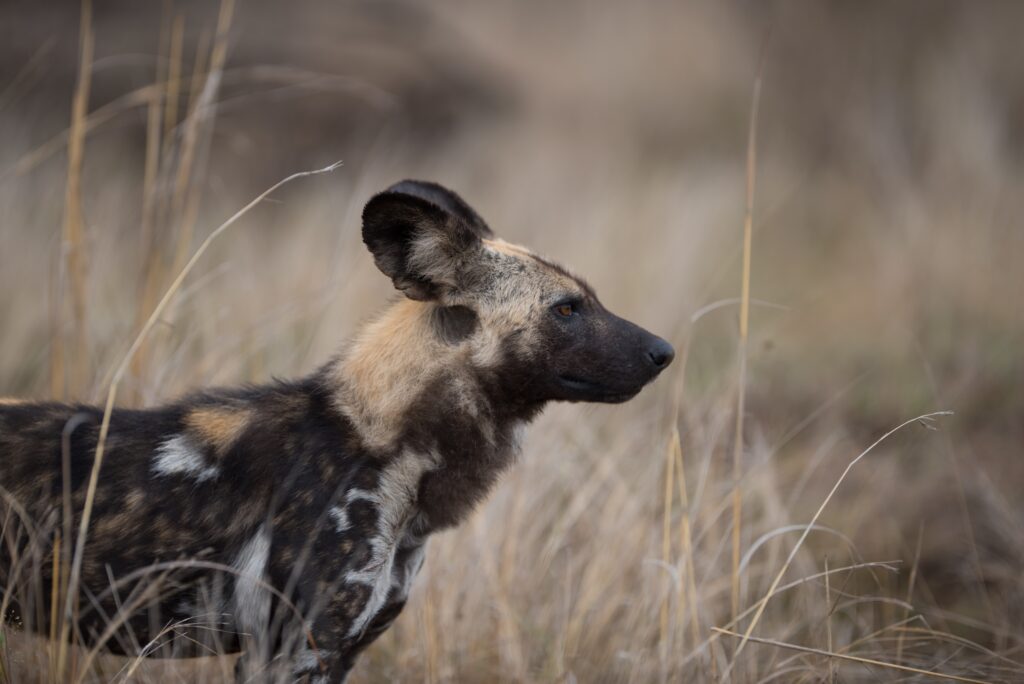
African wild dogs, also known as painted wolves, are highly social and intelligent carnivores that once roamed much of Sub-Saharan Africa.
Unfortunately, their numbers have significantly declined due to habitat loss, human-wildlife conflict, and disease outbreaks, leading to their disappearance from most of their former range. Today, African wild dogs can only be found in small numbers in southern Africa.
Their current range is limited to countries such as Botswana, western Zimbabwe, eastern Namibia, and western Zambia. These areas consist of open plains and sparse woodlands where the African wild dogs can thrive. Conservation efforts are being made to protect these endangered animals and increase their numbers by addressing the threats they face in the wild.
Despite their dwindling population and restricted range, African wild dogs play a vital role in maintaining the ecological balance within their habitats by preying on large herbivores such as impalas and wildebeests.
We must continue to support conservation initiatives to ensure the survival of these unique and fascinating predators in the future.
The human-wildlife conflict poses a significant challenge to conserving African wild dogs. As apex predators, these animals play a crucial role in maintaining the delicate balance of ecosystems. However, farmers often view them as a threat to their livestock and livelihoods.
This has led to the indiscriminate killing of wild dogs through shooting and poisoning, even though they are not the primary culprits when it comes to predation on domestic animals. Unfortunately, this misunderstanding and conflict have put African wild dog populations at risk of decline and endangerment.
Efforts to address human-wildlife conflict involving African wild dogs must involve community engagement and education about the importance of these predators in the ecosystem. Finding sustainable solutions that protect both wildlife and livelihoods is key to ensuring the survival of these endangered animals.
Implementing non-lethal methods such as effective fencing, guard animals, or compensation schemes for livestock losses can help mitigate conflicts and foster coexistence between people and wildlife.
By working together with local communities, conservationists can seek to reduce instances of retaliatory killings against African wild dogs and promote harmonious relationships between humans and wildlife in Africa.

Wild dogs, also known as African painted dogs or painted wolves, are facing a significant challenge in the form of habitat loss and fragmentation.
This disruption of their living spaces is largely due to human encroachment on their natural habitats, leading to conflict between humans and wild dogs as they compete for resources.
As more and more land is converted for agriculture, settlements, and infrastructure like roads, wild dogs are losing the vast open areas where they used to roam freely. This puts them at risk of population decline and localized extinctions.
The fragmentation of their habitats not only increases the likelihood of human-wildlife conflicts but also makes wild dog populations more vulnerable to outbreaks of epidemic diseases. Larger populations have a better chance of recovering from such outbreaks as they may have individuals who are immune or resistant to the disease.
However, when populations become smaller and isolated due to habitat fragmentation, the risk of extinction becomes much higher. It is crucial for conservation efforts to focus on preserving large contiguous areas where wild dogs can thrive without facing these threats to their survival.
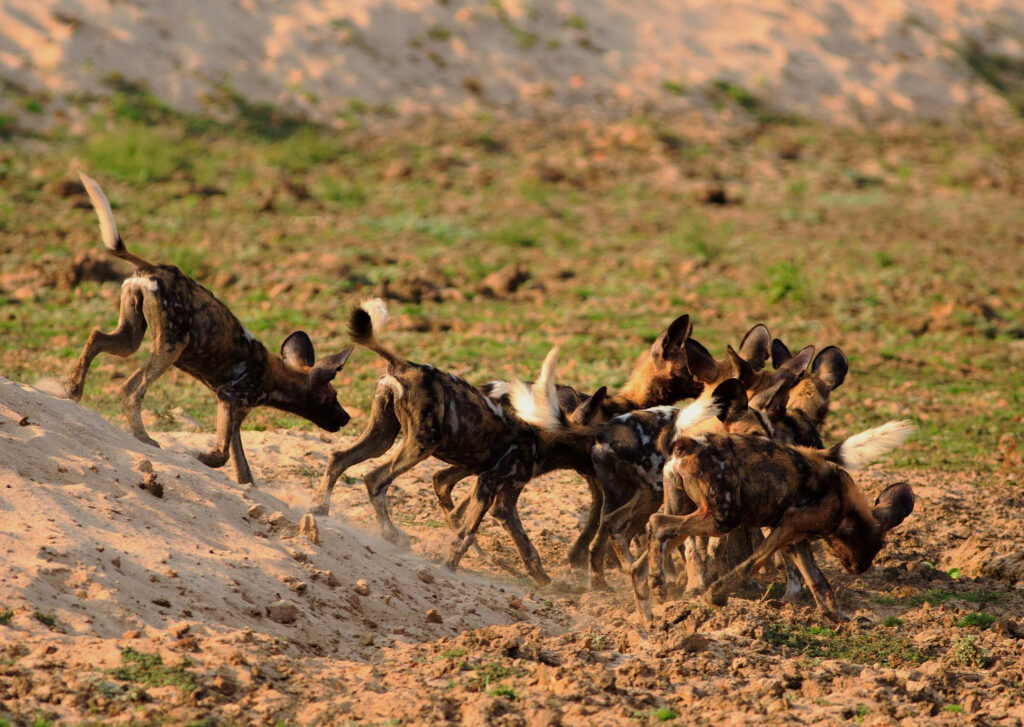
African wild dogs exhibit a highly sophisticated pack behavior that revolves around cooperation, communication, and strong social bonds.
The pack structure is typically led by a dominant monogamous breeding pair, with the female giving birth to a litter of pups that are raised by the entire group. This communal care extends beyond just the pups, as packs have been observed sharing food and assisting weaker or ill members.
These dogs rely heavily on social interactions to survive and thrive, communicating through touch, actions, and various vocalizations. This high level of social intelligence and cooperation allows African wild dogs to work together seamlessly when it comes to hunting.
When it comes to hunting, African wild dogs are truly impressive in their cooperative efforts. Packs of six to 20 (or even more) animals band together to take down prey in a highly organized manner.
While larger packs were more common before the species became endangered, they still demonstrate incredible teamwork and coordination during hunts. Their ability to coordinate movements effectively during pursuits of prey gives them an advantage over solitary hunters, such as large cats.
This pack hunting strategy not only ensures a higher success rate in capturing food but also allows each member of the group to play a crucial role within the team dynamic. Overall, the combination of intricate pack behavior and
African wild dogs are known for their diverse diets, which include a wide range of prey such as gazelles, antelopes, warthogs, wildebeest calves, rats, and birds. This varied diet allows them to adapt to different environments and ensures they have a constant source of food.
Their hunting skills are exceptional, and they are extremely efficient predators. Unlike other large carnivores who may focus on specific types of prey, wild dogs are versatile hunters who can successfully target a variety of animals.
Checkout this documentary by Real Wild:
In addition to being efficient hunters, African wild dogs play a crucial role in maintaining the balance of ecosystems by targeting sick and weak animals. By eliminating these vulnerable prey species, they help prevent the spread of disease and ensure that only the fittest animals survive.
Their ability to run long distances at high speeds also contributes to their success as predators, allowing them to outmaneuver their prey and catch them with precision. Overall, African wild dogs are an important part of the natural ecosystem and play a vital role in ensuring the health and stability of their environment.
Scientists emphasize the need for increased protected areas and connectivity between these subpopulations to ensure the survival of African wild dogs. Their unique social structure and hunting behaviors require large territories to thrive, making it crucial for conservation efforts to focus on expanding their range.
By addressing the underlying factors leading to their decline, such as habitat fragmentation and lack of suitable prey species, we can work towards stabilizing and potentially increasing the population of African wild dogs in the future.
We must act now to prevent further declines in their numbers and preserve these beautiful and important members of Africa’s wildlife ecosystem.
The decline in the African wild dog population is a concerning trend that highlights the importance of conservation efforts to protect these endangered animals.
With only an estimated 6,600 mature individuals left, their numbers are rapidly decreasing due to threats such as habitat loss, human-wildlife conflict, and diseases spread by domestic dogs.
The fact that they are spread out among 39 subpopulations further highlights the fragility of their existence, as small populations are more vulnerable to extinction.
African wild dogs and hyenas share similar appearances and habitats, but they belong to different families. African wild dogs are part of the Canidae family, while hyenas are part of the Hyaenidae family.
African wild dogs differ from hyenas in various ways, including their size, fur pattern, and ear shape. African wild dogs are smaller with a mottled fur pattern, while hyenas are larger with a spotted fur pattern. Additionally, African wild dogs have larger, rounded ears that point upwards.
Despite their name and physical similarities to domestic dogs, African wild dogs are not considered true dogs in the same sense as wolves or coyotes. One key distinction is that they belong to a completely different genus known as Lycaon, separate from the Canis genus that encompasses other canines.
This genetic difference means that African wild dogs cannot interbreed with species like wolves or domestic dogs. Additionally, their behaviors and social structures differ significantly from those of typical domesticated dogs.
African wild dogs cannot be domesticated due to their unique biological and behavioral traits. These animals have evolved in the wild without human intervention, resulting in instincts and behaviors that make them unsuitable for living alongside humans as pets. Their hunting tactics, pack dynamics, and communication methods all contribute to their inability to adapt to a human-centric lifestyle.
As such, conservation efforts for African wild dogs focus on protecting their natural habitats and populations rather than attempting to domesticate them for human purposes.
African wild dogs, also known as painted dogs, are formidable predators that are highly social and organized in packs. Their pack mentality makes them quick to defend themselves against any threatening animal, including humans.
While they are not known to prey on humans and generally avoid confrontations with them, African wild dogs should still be treated with caution and respect. Approaching these animals out of curiosity can potentially agitate them, leading to defensive behavior that could be dangerous for both parties involved.
It is important to remember that African wild dogs are wild animals with strong survival instincts. Their territorial nature and ability to work together as a pack make them efficient hunters and formidable opponents when feeling threatened.
While they may appear curious or even playful at times, humans must maintain a safe distance and avoid any interactions that could provoke these animals. By respecting their space and observing from a distance, we can admire the beauty of African wild dogs without putting ourselves at risk of harm.




